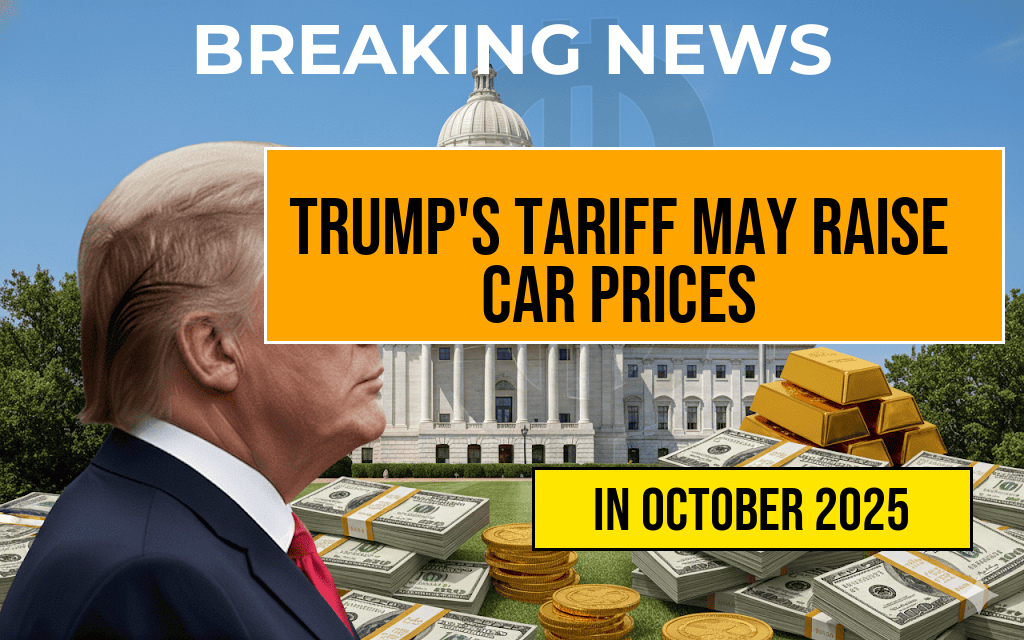Former President Donald Trump’s recent threats to impose tariffs on imported vehicles could lead to significant increases in car prices, with estimates suggesting a potential rise of up to $5,286 per vehicle. This situation arises as the Biden administration grapples with ongoing supply chain issues and inflationary pressures that have already impacted the automotive market. Economic analysts are warning that the proposed tariffs could exacerbate these challenges, making it even harder for consumers to afford new cars while further complicating the recovery of the automotive sector.
The Implications of Tariffs on the Automotive Industry
Trump’s tariff proposal, aimed at vehicles imported from countries such as China and Mexico, is based on a desire to bolster American manufacturing and protect domestic jobs. However, the ramifications of such tariffs could be far-reaching, affecting not only consumers but also manufacturers and the economy at large.
Potential Price Increases
According to a report by the Forbes, the imposition of these tariffs could increase the average cost of new cars significantly. Here are some key findings:
- Luxury Vehicles: The prices of high-end models could see an increase of up to $10,000.
- Mid-Range Cars: Consumers might face a price hike of approximately $4,500.
- Economy Vehicles: More affordable cars could see a rise of around $2,500.
Economic Analysis
Experts argue that the additional costs from tariffs would likely be passed on to consumers, a move that could lead to a decrease in vehicle sales. The automotive industry, which is still recovering from the impacts of the COVID-19 pandemic, may find itself in a precarious position.
“Tariffs on imported vehicles will not only increase car prices but also disrupt the delicate balance of supply and demand we are currently facing,” said John Smith, an automotive economist at the U.S. Bureau of Economic Analysis.
Impact on Consumers
The potential for increased car prices poses a significant challenge for consumers, especially in a time of rising inflation. Many Americans are already feeling the pinch from higher costs for everyday goods and services. Car purchases, which are often a substantial financial commitment, may be postponed or canceled altogether as consumers reassess their budgets.
Reactions from the Automotive Sector
Automakers have expressed concerns about the proposed tariffs. Major industry players argue that tariffs could undermine their competitive edge in the global market. According to a statement from the Alliance for Automotive Innovation, the tariffs would lead to “higher prices for American consumers and hurt the overall economy.”
Furthermore, smaller manufacturers and suppliers could be disproportionately affected, as they may lack the resources to absorb increased costs or renegotiate supply contracts.
Conclusion: A Complex Situation
The debate over Trump’s tariff threats underscores a broader conversation about trade, domestic manufacturing, and consumer protection. As the Biden administration weighs its options, the stakes are high for both consumers and the automotive industry. With prices already rising due to inflation, the addition of tariffs could further complicate the landscape of car ownership in America.
As this situation unfolds, stakeholders from various sectors will be watching closely, aware that the outcomes will resonate beyond the automotive industry and into the wider economy.
Frequently Asked Questions
What are the potential impacts of Trump’s tariff threat on car prices?
The tariff threat could lead to an increase in car prices by as much as $5,286, affecting consumers and the overall automotive market.
Which vehicles are most likely to see price increases due to tariffs?
Vehicles that rely heavily on imported parts and materials are likely to face the highest price increases due to tariffs.
How do tariffs affect the overall economy?
Tariffs can lead to higher prices for consumers, reduced demand for automobiles, and potential job losses in the manufacturing sector.
What alternatives do automakers have to mitigate the effects of tariffs?
Automakers may seek to source materials domestically, adjust their supply chains, or increase vehicle prices to offset the costs of tariffs.
Are there any potential benefits to imposing tariffs on imported cars?
Proponents argue that tariffs could protect domestic manufacturing jobs and encourage consumers to buy American-made vehicles.

Leave a Reply